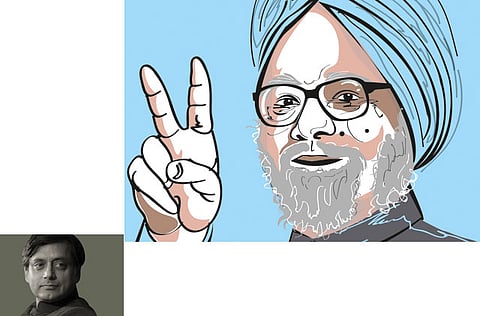Manmohan Singh’s Second Wind
The rebirth of Singh the reformer has come after a long wait

In September, India’s mild-mannered Prime Minister, Manmohan Singh, turned 80. He also turned a page: After months of being pilloried by every pundit with a soapbox for indecision and weakness, and for presiding over “policy paralysis” while corrupt colleagues allegedly made off with the country’s silver, Singh has boldly seized the initiative. A series of reform announcements and some frank talk to the public, have underscored his new message: “I am in charge.”
The initial steps that he has announced are impressive. Several controversial provisions included in the government’s last budget are being reviewed. Foreign direct investment will be allowed to enter the retail sector and civil aviation — bold decisions that cost the government the support of a recalcitrant coalition ally.
Likewise, the government has reduced subsidies on diesel and cooking gas in the face of vociferous opposition, including a one-day strike that shut down parts of the country. And more reforms are in the works, sending an unmistakable signal that India is not ready to be written off, as had seemed to be happening earlier amid tales of investor flight and credit-rating downgrades.
The rebirth of Singh the reformer came after a long wait. As finance minister in 1991, Singh unleashed the liberalisation of the Indian economy. “No power on earth,” he memorably told parliament, quoting Victor Hugo, “can stop an idea whose time has come”.
The measures that he took contributed more than anything else to earning India — long derided for its “licence-permit-quota Raj” and its snail-like “Hindu rate of growth” — a global reputation as the world’s next big economic success story. As Prime Minister since 2004, his success story continued even during the global recession.
But Singh’s most recent chapters have been less positive. India’s growth has slipped, while his government has been consumed by one corruption scandal after another. His mildness came to be dismissed as timidity, his unflappable manner excoriated as complacency and ineffectiveness. The bloom had come off the Indian rose, and Singh — damned by Time magazine as “the underachiever” — was blamed.
With just a year-and-a-half to go before the next scheduled general elections, Singh must walk a tightrope — sending the right signals to global investors that India remains open (and profitable) for business, while assuring voters that he has their interests and concerns in mind. The famously reticent Singh even delivered a televised address to the public, in both Hindi and English, explaining his decisions. That might not be unusual elsewhere, but in India, it was almost unprecedented, thus serving to reaffirm that vital changes were in the works.
Part of Singh’s problem is that decisions that hurt voters (higher diesel prices, fewer subsidised cooking-gas cylinders) have an immediate impact, whereas the benefits of foreign investment, for example, take years to become apparent. All politicians in democracies think in the short term; few have time horizons that extend beyond the next election. With his 20-year record of accomplishment to show the public, Singh has a better case than most to be trusted by voters when he says that he is acting in their long-term interest.
Within Singh’s Congress Party, the pressure will mount to match economic-reform initiatives with “pro-poor” programmes. The Congress can rightly take credit for the most far-reaching programme — the Mahatma Gandhi National Rural Employment Guarantee Scheme, which assures one member in every poor rural family 100 days per year of paid employment. This programme, financed from additional revenues generated by earlier reforms, is the poster child for the ruling party’s commitment to ending poverty. Funds saved by measures such as raising diesel prices could be spent on new schemes that similarly target the aam aadmi, or the common man, by whom the Congress swears.
There is also talk of a long-delayed Food Security Bill being brought to parliament. Land-acquisition reforms are in the air and the New Delhi rumour mills are abuzz with talk of an imminent cabinet reshuffle to inject young blood into a notoriously geriatric Council of Ministers.
Singh’s accomplishments are extraordinary. The India that existed when he took office in 1991 was an inefficient, centrally planned economy. For 45 years, bureaucrats had occupied its commanding heights, stifling enterprise under a straitjacket of regulations and licences, erecting protectionist barriers against foreign trade and investment in the name of self-reliance, subsidising an unproductive public sector and struggling to redistribute the country’s poverty. Twenty years later, India boasts of a thriving, entrepreneurial and globalised economy, with a dynamic business culture. Today’s India competes on its own terms and pulls more than ten million people out of poverty every year.
The prime minister who has done the most to make this possible has returned to the charge, clearly determined to consolidate his legacy after a spate of bad-news stories. India, and the world, will watch him with hope.
— Project Syndicate, 2012
Shashi Tharoor was Indian minister of state for External Affairs and UN under-secretary-general. He is currently a member of India’s parliament. His most recent book is Pax Indica: India and the World of the 21st Century.


